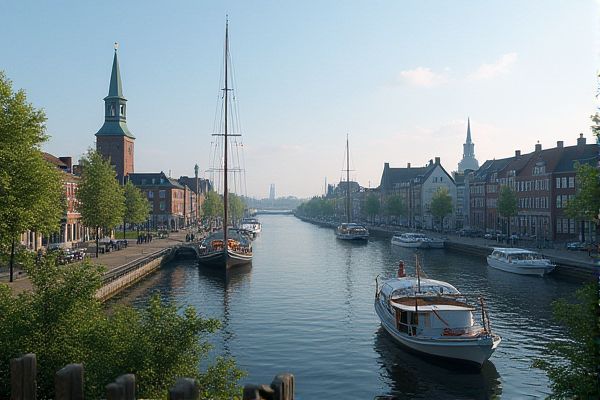
Insights from Denmark residents and expatriate communities: High taxation supports welfare benefits. Biking is a primary mode of transport. Danish language knowledge is helpful. Emphasis on work-life balance. Weather can be cold and rainy. Healthcare is publicly funded. Housing can be expensive, limited. Danish society values equality. Punctuality is highly respected. Embrace the concept of "hygge".
High taxation supports welfare benefits.
In Denmark, high taxation is widely accepted by both residents and expatriates, with 88% of Danes happy to pay their taxes, as they see it as a necessary investment for the extensive and high-quality welfare benefits and public services they receive, such as free education, healthcare, and childcare. This system is financed through progressive taxation, where higher-income individuals and companies pay more, ensuring equal access to fundamental welfare benefits for all citizens. For more information on this unique system, visit the Danish Welfare State.
Biking is a primary mode of transport.
Biking is a primary mode of transport in Denmark, with 16% of all trips done on a bike, and in Copenhagen, 44% of trips to work and education were by bike in 2019. The infrastructure is highly supportive, with significant investments in cycling lanes and a strong culture of prioritizing cyclists, making it a preferred mode for both residents and expatriates. For more detailed insights on how cycling is integrated into Danish culture, explore the comprehensive Facts and Figures on Cycling in Denmark which illustrates the nation's commitment to fostering a cyclist-friendly environment.
Danish language knowledge is helpful.
Knowing Danish is crucial for expats in Denmark as it assists in communicating effectively, building meaningful social connections, and grasping the cultural nuances. Although many Danes speak excellent English, mastering the local language significantly enhances integration and trust. Expats can learn Danish through language schools, volunteer services, and conversation partners. This proficiency opens more doors, allowing them to connect deeper with the community and appreciate the local literature, art, and film. For further insights on overcoming the challenges of expat life in Denmark, you can explore Navigating Danish Life to discover effective coping strategies while living abroad.
Emphasis on work-life balance.
In Denmark, residents and expatriates alike benefit from a strong emphasis on work-life balance, characterized by a 37-hour work week, flexible work hours, at least five weeks of paid annual leave, and generous maternity and sick leave policies, all of which promote a healthy lifestyle, improve well-being, and increase productivity. This culture is supported by policies like Flexjobs and a societal value on leisure time, ensuring employees can balance work with personal and family life effectively. Learn more about this approach to work-life balance at Travel Noire.
Weather can be cold and rainy.
Denmark's climate is characterized by unpredictability, with mild winters and cooler summers, and a significant presence of rain throughout the year. Residents and expats often dress in layers and use rainwear to adapt to the changing weather conditions. For more information about acclimating to the weather in Denmark, you can visit the helpful resource provided by Expat Focus, which offers insights on how to best prepare for the country's unique climate.
Healthcare is publicly funded.
Denmark's healthcare system is renowned for its publicly funded structure, providing universal access to comprehensive health services at no charge to citizens. This system is primarily financed through income tax and administered via three governmental levels: the state, regions, and municipalities. Despite its inclusivity, challenges remain, particularly for migrant communities who often encounter healthcare discrimination. Efforts are underway to address these disparities through the establishment of specialized clinics and a collaborative patient-doctor approach. Furthermore, the publicly financed healthcare system extends to all primary, specialist, hospital, and preventive care, encompassing mental health and long-term care services. However, expatriates residing in Denmark might require additional insurance during the initial three months or for services not encompassed by public healthcare. For a more detailed understanding of Denmark's healthcare dynamics, visit the Euro Health Observatory for comprehensive insights.
Housing can be expensive, limited.
Housing in Denmark, particularly in cities like Copenhagen, can be very expensive, with a studio or 1-2 bed apartment costing between DKK 8,000 - DKK 10,000 per month. Expats often face limited options and high competition, especially for long-term rentals, and may need to consider smaller cities like Odense for more affordable alternatives. For more detailed insights into the challenges and solutions for Living in Denmark as an Expat, exploring comprehensive resources can be invaluable.
Danish society values equality.
Danish society places a high value on equality, particularly gender equality, as evident from the Denmark Canon and supported by all political parties, though Norway and Sweden have an even higher preference for this value. This emphasis on equality is reflected in the high percentage of women working outside the home and the country's progressive laws and policies. For more insights on these values, visit the Denmark Canon website, which further explores these societal principles integral to Danish culture.
Punctuality is highly respected.
Punctuality is highly respected in Denmark, with appointments and meetings expected to start on time, and any form of lateness, even by a few minutes, being viewed negatively and considered poor form. Danes prioritize punctuality in all contexts, whether business or social, and it is crucial to observe this practice to avoid offending others. Time is highly valued in Denmark, and punctuality is considered a sign of respect, applying to all types of meetings and social engagements. To delve deeper into Danish etiquette, visit the How To Live In Denmark website for more insights.
Embrace the concept of "hygge".
Embracing "hygge" involves creating a warm atmosphere and enjoying life's simple pleasures with good people, whether through candlelight, cozying up for a movie, or sharing meals and discussions with family and friends, reflecting the Danish values of comfort, community, and contentment.
